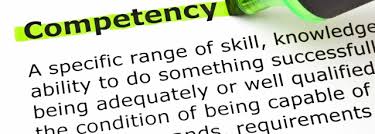Competency Style Interviews
 When answering competency style questions it is best to adopt the STAR model, which will allow you to structure your answer in a logical and concise manner.
When answering competency style questions it is best to adopt the STAR model, which will allow you to structure your answer in a logical and concise manner.
Situation – Describe the situation/problem you were faced with (try and keep your examples recent)
Task – what did you have to do?
Action – what action did you take and why. Were there any challenges/obstacles and how did you overcome them?
Results – highlight the outcome
Preparing for a competency-based interview
The best way to identify what competencies the organisation is likely to require is to review the job description and discuss this further with your Consultant who will be able to advise you. For each core competency try to think of specific examples of when you have evidenced those behaviours but do not prepare specific answers prior to your interview as this is likely to mean that you provide answers that do not fully answer the question. You may find it helpful to run through some competency examples with your Consultant or perhaps with a friend prior to your interview.
Common competencies
To help you we have listed below some of the most common competencies that companies look for. Please note that these definitions may not be identical to those of a prospective employer and are just to give you an idea of what to expect.
Drive for results
This competency is trying to assess personal motivation and how you approach challenges.
Example Questions:
- What achievement are you most proud of?
- Give me an example of a time when you have had to achieve a specific result
- What opportunities have you identified and used to achieve success?
- Tell me about a time when you have ‘made things happen’ for yourself/your team?
Communication
This competency is looking for the ability to communicate effectively and to influence others to act and/or commit support to one’s own goals or objectives. Many roles are looking to establish that you understand the need to adapt your communication methods depending on the situation and individuals that you are facing.
Communication methods for example can include: 1-2-1 discussions (formal and informal), group presentations, telephone, email etc. Different ‘audiences’ may include peers, subordinates, senior management, customers, suppliers.
Example Questions:
- Can you please give a specific example of when you have had to influence a colleague to you way of thinking?
- Tell me about a particularly difficult issue you had to communicate.
Planning and organising
This is looking to assess if and how you plan activities and/or projects. It is relevant for all levels of roles, not just managerial positions. Often it may be looking to see how you fit your plans into the project plan, for example.
Example Questions:
- Describe a time when you have had to plan a large piece of work
- How would you approach ensuring that you delivered results in your role.
- It’s a busy day with conflicting priorities and deadlines, what do you do?
Customer Focus
Individuals who display this competency understand and believe in the importance of customer focus. They listen to and understand the needs of external and internal customers. They meet and exceed customer needs to ensure satisfaction.
Example Question:
- Can you give us an example of when you have dealt with an upset or angry customer in the past?
Influencing or Persuading Others
You may have strong verbal skills but can you influence another person to change their thinking or take some action – perhaps a colleague follows your advice or a client decides to buy a service or product. At management level have you the skills to persuade and involve rather than coerce and punish? Are you ethical in your dealings with people?
Example Questions:
- Tell me about a time when you were able to change someone’s viewpoint significantly?
- Tell me about a time when you were asked to do something that you disagreed with?
Interpersonal and Team Skills
The desire to build and maintain relationships in and beyond the workplace is critical. Many workplaces function on the basis of project teams. Those who are highly collaborative and co-operative are most likely to thrive in this type of environment.
Example Questions:
- What skills and personal qualities have you contributed to the teams you have been part of?
- Tell me about the most difficult person you have worked with.
Problem Solving and Decision Making
How do you come to a decision? What information do you utilise and how do you break that down and filter it to ensure your decisions are sound and valid? Are you able to make decisions or do you rely too heavily on others.
Example Questions:
- Tell me about a difficult decision that you have made.
- Tell me about an unpopular decision you have made.
Exercise
 There is a useful document that you can complete that enables you to work on the competencies you need to focus on for the interview: PREPARING FOR INTERVIEW COMPETENCIES
There is a useful document that you can complete that enables you to work on the competencies you need to focus on for the interview: PREPARING FOR INTERVIEW COMPETENCIES












